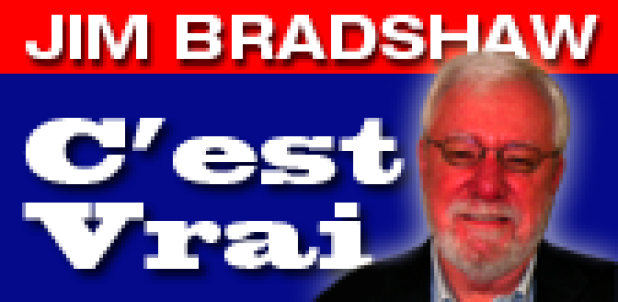
Jim Bradshaw: Dachshund knew how to call for help
In February 1953 a dachshund named Hugo barked out a testimony to at least one benefit of the good old days when telephone calls were placed through local operators who knew everyone in town and, some said, a lot of their business that had nothing to do with making a call.
Young squirts, say people under 50, would probably have never heard of a telephone operator without reruns of “The Andy Griffith Show,” in which Sheriff Andy Taylor or Deputy Barney Fife picks up the long-necked phone to ask, “Gert, get me Floyd at the barber shop.”
In fact, those youngsters, and surely their children, would probably not recognize the distinctive clickety-whirr sound made by the rotary-dialed telephones that eventually ended the days of switchboards and their operators.
Those rotary phones first came into service in the 1930s, and let people make local calls directly, bypassing Gert and her cohorts.
The dial service was introduced first in the bigger cities, but it cost too much at first to bring it to small communities such as Abbeville and its south Louisiana neighbors.
Most of them kept their switchboard service for local calls into the 1960s, and operators handled long-distance even later.
Southern Bell entered a float in the Dairy Festival Parade in 1960, “pointing to the attributes of Direct Distance Dialing,” which the Meridional said would begin in Abbeville that November.
Other cities came on line for direct dial long distance about the same time.
A Southern Bell ad in December 1960 said the service was available in Abbeville, Crowley, Eunice, Lafayette, Lake Charles, New Iberia and Opelousas. Smaller towns got the service later. Meridional articles note, for example, that Erath got DDD in 1972. Gueydan didn’t get it until 1974.
But that was all far in the future when Hugo the dachshund made the Meridional’s front page on Feb. 5, 1953.
According to the story, the unidentified telephone operator knew exactly what to do when she answered a call and heard nothing but barking.
She knew that the telephone number belonged to Gladu Hebert’s service station, and she knew that his 2-year-old dog Hugo sometimes went to work with him.
“Hugo was barking into the telephone receiver in the service station office. That could mean but one thing — Hugo was in trouble,” Meridional writer Joe Choate reported. “The operator, knowing both
Hugo and his master, buzzed the Hebert residence and told the dog’s owner of the incident.”
That’s when Gladu realized he’d accidentally locked Hugo in the station.
According to the newspaper story, “Hebert said that beyond a doubt the dachshund saw himself in a pickle and figured using the telephone was the only way out. Hugo had leaped on the desk, knocked the receiver off the hook and began to bark to make known his desire for freedom.”
Hugo was still on the desk barking into the phone when Gladu got there to rescue him.
The newspapers also carry reminders that the operators were, in effect, the first “911” responders for more serious emergencies, finding doctors in medical emergencies, summoning first responders, acting quickly when there was trouble.
Their knowledge of the people and communities they served was invaluable.
We can find evidence of that in notices, published fairly frequently, like the “Card of Thanks” in the Meridional in August 1969. In this one, Mr. and Mrs. Alvin Desormeaux thanked the Erath, Delcambre,
and Abbeville fire departments, “all volunteer firemen, friends, and neighbors who assisted in salvaging our [service] station which was destroyed by fire.”
They also publicly thanked the telephone operator who had turned out the firemen and gave them directions.
You can contact Jim Bradshaw at jimbradshaw4321@gmail.com or P.O. Box 1121, Washington LA 70589.
